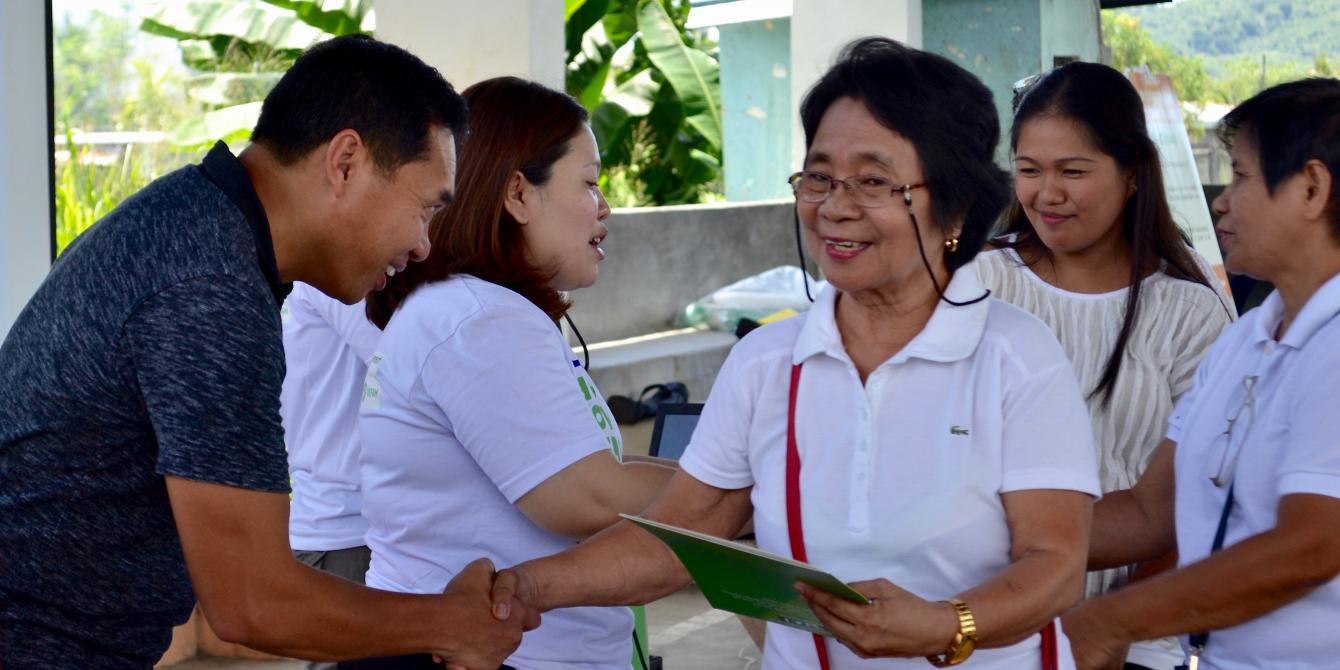
Financial Inclusion Program Manager Niña Abogado (second from left) awards the insurance plan for the Savings or Change group. (Photo: Angela Casauay/Oxfam)
Going Digital: Making financial services accessible to rural areas
In a covered court in the middle of a ricefield in Tacloban City, Philippines, cooperative banker-development worker Ramil Boniel is helping Oxfam award insurance plans to families, many of whom were displaced by Super Typhoon Yolanda in 2013. The insurance plans are incentives for members who were able to meet their target savings as part of a self-help group “Savings for Change”.
Ramil is working with the community-based savings association to teach its members the value of savings and the importance for families to prepare for their financial needs before and during a disaster.
Through iAFFORD (Inclusive and Affordable Financial Facilities for Resilient and Developed Filipinos), members of the group received a financial literacy training on micro-insurance facilitated by Ramil.
iAFFORD is a digital financial inclusion project lead by Oxfam, in partnership with PayMaya, Visa, the Australian Government and Metro Ormoc Community Multipurpose Cooperative Inc.
Banks for the masses: Serving Communities in Eastern Visayas
For two decades now, Ramil has been working with Metro Ormoc. The cooperative was founded in 1978 with only 78 pioneering members composed of farmers and parishioners of Saints Peter & Paul Church in Ormoc City, where sugarcane farming is the main industry.
For a small cooperative with a capital of Php 5,850 (USD 115), Metro Ormoc has now been recognised as the First Billionaire Cooperative in Eastern Visayas with 100,000 members. It has been ranked as among the top eleven of the best multi-purpose cooperatives in the Philippines, with 40 branches and satellite offices across the country. The cooperative was founded to address farmers’ need for additional capital.
Ramil is proud to be working for an organization that has risen to become a top cooperative in the country from its humble beginnings.
“Cooperatives are banks for the masses. They cater to those who have no access or cannot meet the requirements of formal financial institutions like banks. If we look at the Philippines, we can say there is a bigger market for coops than formal institutions,” Ramil said.
Ramil hails from Bien Unido, Bohol. Growing in a poor farmer family with a meager income and has no access to loan and other financial services made Ramil promised to himself and to his family that when he finished his education, he will work for providing accessible financial services to poor and low-income families.
For Ramil, his work gives him a sense of purpose. “I enjoy educating and informing cooperative members about how they can handle their money well. This is what made me last this long in this business – the sense of fulfillment I get from it,” he said.
“Working with Metro Ormoc gives me a sense of fulfillment,” Ramil said. “I can help ensure that even those living in remote communities have access to financial services.”
“This is what sets the Metro Ormoc from others. Unlike other cooperatives that are single focus, we offer a wide range of services – from savings to time deposits, as well as loans and insurance. We cater to different sectors. We also have ATMs in select areas,” Ramil said.
In the Philippines, 7 out of 10 people do not have access to banks and other formal financial institutions. Some 68 percent of Filipinos also choose to keep their money at home, making them vulnerable to emergencies, such as disasters.
While those in the agriculture industry still comprise a huge chunk of the Metro Ormoc clientele, the cooperative has diversified into other services over the years. They are not stopping anytime soon.
(OCCCI branch in Biliran, Eastern Samar. Photo from web)
Going Digital: Making Financial Services Accessible
The cooperative is looking forward to going digital and making their services even more accessible. The work has received a welcome boost from the iAFFORD project receiving a “Technology Against Poverty” grant from the Australian Government and Google.org.
Ramil said going digital will help make their services become more efficient by minimising costs through paperless transactions. It will also make transactions easier for their clients – mostly business owners and farmers living in rural areas, where transportation and communication are usual problems.
“If there are digital financial services, they can do transactions anywhere, with or without access to the Internet,” he said. “It will also minimise risks, especially for those who have to travel long distances just to deposit their savings,” he added.
“Partnership with Oxfam through iAFFORD makes this possible. Even members with no or little knowledge of digital financial technology will learn to be aided with information and can access financial services even when they’re at home,” Ramil said. (Article written by Angela Casauay/Oxfam)


 Follow us on Facebook
Follow us on Facebook Instagram
Instagram Follow us on Twitter
Follow us on Twitter LinkedIn
LinkedIn